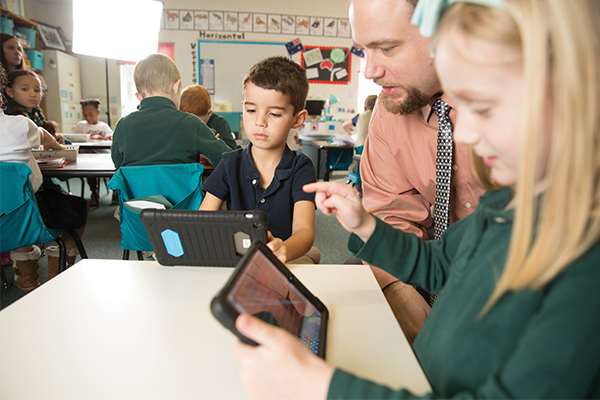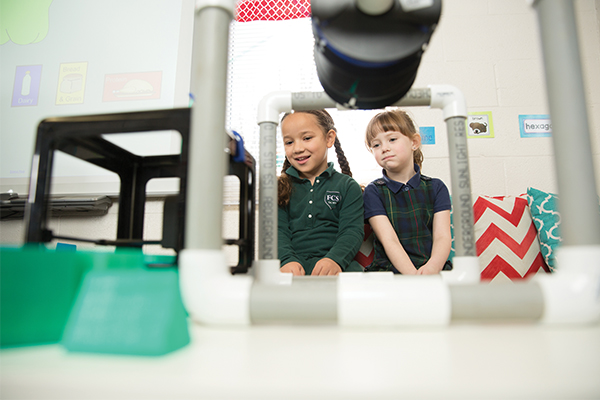The High-Tech Environment of an FCS Student
Leadership is a core value that works its way through every part of education at FCS. In today’s world, effective leadership includes technology.
The technology programs at Fredericksburg Christian School benefit from the talented leadership provided by Brian and Emily King, where Brian is the Director of Technology, and Emily coordinates instructional technology.
The Kings approach technology from a unique viewpoint that is rooted in the desire to raise Christian leaders for life. “We want technology to be uniquely FCS, too.”
Their leadership perspective about tech results in an approach that reaches throughout student experiences at the school. Practically speaking, technology is present wherever it adds to the learning experience. This includes SMART boards, classroom computers (and shared tablets in the lower school), multiple computer labs, a modular makerspace with 3D printers, and a 1:1 iPad program for every student in grades six through twelve.
While the presence of tech is everywhere at FCS, one big difference is the way that technology is used. Technology is normally placed into the classroom and teachers are left to figure out how to use it. At FCS, there is a focused effort to help each teacher implement a technological strategy into their own specific subject and age level, rather than just assuming any technological expertise.
Emily King serves teachers by helping find the best fit for their classroom. “We put a lot of effort into helping teachers implement effective technology plans that fit their curriculum, with the approach customized to increase the impact of the lesson plans, the needs of the student, and the personality of the teacher,” says Emily.
This is quite different than what some parents experienced when they were in school, where technology was used as a way to give the teacher a break and the students some entertainment on a Friday afternoon. Or, where these kinds of experiences were restricted to a computer lab.
At FCS, “teachers find ways to make their lesson plans more creative and more interactive using technology,” explains Emily. “This can include rich media that helps students go deeper with a topic, or interactive experiences that challenge them with a quiz in a game show-style, or the creation of a presentation using a variety of software.” They explore, they collaborate, they research, and they create in a way that deepens both their skills and knowledge on a topic.
Getting comfortable with “Sparky” the robot.
Beginning early, students at FCS learn to become tech literate. Rather than focusing on a specific software that will eventually change, they become proficient at learning how to use technology no matter what flavor. Exploration–like that which happens with their new pet robot SPRK (called Sparky)–helps them to learn advanced tech skills at a young age. Bowling with SPRK is a favorite activity as students program the robot to take down the pins. Older students participate in the Hour of Code by Code.org during the school year to help them get comfortable with how technology really works.
Technology is personal.
The tipping point, at which most students use mobile devices, happened 3 or 4 years ago. Today, FCS students are among the 50% of America’s students who use a computer at school. That fact translates into classroom computers and labs at all campuses; plus, a tablet for every student in grades 3-12 with shared tablets in the lower grades. Across the nation, more than 90% of upper school students and more than 50% of students in 3rd through 5th grade have a mobile device. For students, technology is more and more tied to personal devices–whether it’s at home or in the classroom. Regardless of the location, mobile devices need to be personally managed. Fredericksburg Christian believes that becoming a leader means learning how to manage and use technology in a way that honors God.
Across the nation, more than 90% of upper school students and more than 50% of students in 3rd through 5th grade have a mobile device.
Learning styles are personal, which includes how technology is handled. It’s important to note that the presence of iPads and other computers “doesn’t mean that one size fits all when it comes to learning styles and homework completion,” says Brian. FCS works hard to help students find their own learning style and use the right tools, whether that is a tablet, a notebook and pencil, or a whiteboard.

The influence of tech.
There’s no question that the 1:1 iPad program, classroom technology, the makerspace, and computer labs are an important school advantage. However, it’s how that technology is used and what students learn about their individual use of technology that makes the program truly unique.
From the King’s viewpoint: “at its core, technology is a tool that influences and amplifies influence.” They want students to learn how to manage technology in a way that teaches students to “use their influence for the Kingdom of God.”
Like any powerful tool, it offers both promise and risk. And every parent knows there are no shortages of risks for students on the Internet. To equip students and families for safety online, the Kings have developed a resource for parents called Keeping Kids S.A.F.E. Online. This annual training program is offered to strengthen families and to get the home and school in sync about their technology approach. This focuses on four practices for families that help protect their children online: supervision – awareness – filtering – education (S.A.F.E.).
Leadership is creative, and so is the way that technology is applied at FCS. “We want students to learn to be creators, not just consumers, when it comes to technology. We work with teachers to encourage the use of technology in the creation and sharing of information by students,” says Emily.
It would be easy to confuse the presence of tablets in the hands of every student with an over-reliance on technology. Teachers use the tablets as a natural part of the process of learning, sharing, and cooperating. But it is not a replacement for instruction or interaction.
In Brian’s perspective, “personal technology doesn’t take the place of quality instruction, it simply provides one more tool that students can use to learn.”
At FCS, students learn the power and potential of technology as it is balanced against the responsibility and impact that it can create for both good and evil. It is viewed as a tool that students who are growing into Godly leaders can employ to create, connect, and influence for God’s Kingdom
Experience FCS for yourself! Schedule a visit.

